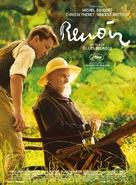Reviews provided by RottenTomatoes
Stephen Holden, New York Times: The movie, like its subject, refuses to stir up unnecessary melodrama. Read more
Joe Morgenstern, Wall Street Journal: "Renoir" is so beautiful, and so intelligently conceived, that you keep waiting, in vain, for a bit of fire to break out in the narrative. Read more
Mike D'Angelo, AV Club: In short, it's the story of how two great artists were influenced by the naked lady lounging around their house. Read more
Bill Goodykoontz, Arizona Republic: One would expect a film about French artist Pierre-Auguste Renoir to look beautiful, to be shot in warm, sumptuous colors. And one would not be disappointed in Gilles Bourdos' "Renoir." Read more
Ty Burr, Boston Globe: "Renoir" doesn't get much beneath the surface - but, good God, what a surface. Read more
J. R. Jones, Chicago Reader: If you love the paintings of Auguste Renoir or the films of his son Jean, there's a good chance you'll sit through this slow-moving prestige item. Read more
Peter Rainer, Christian Science Monitor: The sequences of Renoir and his chambermaids luxuriating in the sun-soaked countryside summon up not only Renoir's paintings but also such great Jean Renoir films as A Day in the Country." Read more
Tom Long, Detroit News: With its warm colors and sweet streams of light, its love of both the countryside and the human form, it makes you dream of painting. Or making movies. Or just luxuriating in the brilliance. Read more
Todd McCarthy, Hollywood Reporter: Appreciative but undramatic look at the young woman who was vital to the Renoirs, father-painter Pierre-Auguste and son-filmmaker-to-be Jean. Read more
Kenneth Turan, Los Angeles Times: A lush, involving film that deals not with one Renoir but two, as well as the strong-minded woman who was a key player in both their lives. Read more
Stanley Kauffmann, The New Republic: What beguiles us is the chance to be with these people at that time, by means of a picture that is so sympathetically acted and so pleasant to look at. Read more
John Anderson, Newsday: Sumptuous, savvy study of art making, love and light. Much of the passion, however, is in the pictures. Read more
David Denby, New Yorker: The director Gilles Bourdos's sunshiny Portrait of the Artist as an Old Man. Read more
Stephen Whitty, Newark Star-Ledger: Theret - who is supposed to be playing the muse to two great artists - never seems much more than young and pretty, and Rottiers only young and uncertain. When the film switches to them, it goes still. Read more
Mark Jenkins, NPR: The performances are assured, the ambiance impeccable and the themes resonant. Read more
Miriam Bale, New York Daily News: Breathtakingly lush, lingering on subtle textures. Read more
Kyle Smith, New York Post: Like the paintings of the master, "Renoir" is beautiful to look at, but it would be a mistake to call the film (or its subject) shallow. Read more
Michael Sragow, Orange County Register: A voluptuous, under-dramatized account of Pierre-Auguste Renoir's heroic final phase. Read more
Colin Covert, Minneapolis Star Tribune: Stately to a fault, the film is not enough drama, too much still life. Read more
Joe Williams, St. Louis Post-Dispatch: For those who just want to float away on waves of beauty, "Renoir" is a boating party. Read more
Adam Nayman, Globe and Mail: Gilles Bourdos's film is more conventional than its mould-breaking subjects deserve. Read more
Linda Barnard, Toronto Star: As sensually beautiful as the work of its subject matter, French filmmaker Gilles Bourdos's dreamy biography Renoir is more a series of tableaux than a narrative film. Read more
Trevor Johnston, Time Out: Thanks to ace Taiwanese cameraman Mark Ping Bing Lee, it conveys the inspirational qualities of sun-dappled light and rosy flesh. Read more
Keith Uhlich, Time Out: At least Mark Ping Bing Lee's luscious cinematography distracts from the shallow storytelling. There are worse things than luxuriating in a two-hour Cote d'Azur travel ad. Read more
Marsha McCreadie, Village Voice: Wisely, director Gilles Bourdos keeps the pace slow, what with all the tensions beneath the surface: Oedipal conflict, career choices, even class struggle. Read more

